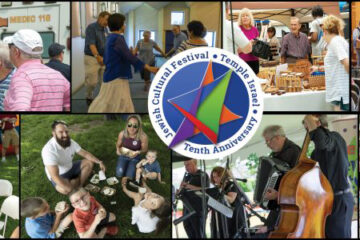Temple Israel expands festival offerings

By Marshall Weiss, The Dayton Jewish Observer
Along with baked goods, belly dancers, and kosher beer, Temple Israel’s third Jewish Cultural Festival will feature local restaurants serving up world Jewish cuisine, and guests can learn how to save lives through organ donation.
More than 200 temple volunteers will be ready to greet 1,000-plus attendees at the June 9 festival, which has become the congregation’s major annual fund-raising event.
“We have four different restaurants and each one will be providing either Jewish food or their own ethnic twist on Jewish classics,” said Sara Faust, who co-chairs the festival with Carol Finley.
The restaurants — C’est Tout, El Meson, Meadowlark, and Pasha Grill — will have booths along with Temple Israel’s bakery, to be stocked with thousands of cookies, hamantashen, mandelbrot slices, plus honey cakes and challahs that volunteers baked in the temple’s kitchen.
“We’re getting a lot of eclectic vendors from the Oregon District, the Yellow Springs area,” Faust added. “We’re having some returning entertainers that were successful in the past like the Cincinnati Klezmer Project and the Kettering Civic Band but we’re also adding the Muse Machine and Marc Gilbert’s rock band, Deceptive Play.”
Puppeteers with the Zoot Theatre Company will walk their creations around the festival and will present a mask-making workshop.
Hillel Academy students, who wrote and performed a song as part of Zoot’s Holocaust production, And A Child Shall Lead, will perform the song there too.
For the festival’s education component, Faust said, the temple will focus on Judaism around the world.
Sessions will include Rabbi David Sofian talking about Ashkenazi (Eastern European) and Sephardi (Mediterranean) Jews, a discussion about the temple’s Torah scrolls from around the world, a session about the Holocaust with Dayton Holocaust Committee Chair Renate Frydman, and another about the Jews of Dayton led by Bob Thum.
Faust said the festival is intended as a community-wide event, for the general public.
“The majority of our attendees, I think were not Jewish,” she said. “The idea is not only to have the festival to introduce people to Jewish life and traditions but also to just build bridges.”
Mitzvah Alley
With all the people expected to attend, Temple Israel’s educator and assistant rabbi, Karen Bodney-Halasz, thought this year’s festival could make an even greater impact.
“In addition to all the things we’re proud of when we’re Jewish — our culture and we’ve got our food, we’ve got our music, we’ve got everything that identifies us as Jewish — one of the biggest identifiers is our social action and what we’re doing with our lives to make it a better world,” Bodney-Halasz said.
The result is Mitzvah Alley, an area inside the temple, where guests can learn about the mitzvah (commandment) to preserve or save a life.
The Gift of Life Bone Marrow Foundation, North America’s only Jewish bone marrow registry, will have a booth at Mitzvah Alley where people can register.
“There will be many Jewish people there and you’re more likely to find a match for a bone marrow donor if it’s someone from the community,” said Cheryl Lewis, co-chair of Temple Israel’s Social Action Committee.
“All registrants who meet age and health requirements will be able to perform a quick cheek swab on themselves and be entered into the bone marrow registry,” Bodney-Halasz explained.
Congregant Judy Grampp, a paramedic who lost her grandson, Joey Cross, to Tay-Sachs, will provide information about Jewish genetic disorders.
And Temple Israel member Barb Gronefeld will talk to people about the importance of organ donation.
The festival coincides with the 10th anniversary of Gronefeld’s own kidney transplant from a cadaver donor, at Jewish Hospital in Louisville.
“I decided to celebrate it,” Gronefeld said. “I want to do something — because I was so lucky to have gotten a kidney — to make other people more aware that you can be a donor, and for a lot more things than just kidneys. It gives someone the gift of life who might not otherwise be alive, because I wasn’t going to make it much longer on dialysis.”
Gronefeld said her kidney failure came from a hereditary disease.
“The longer you’re on dialysis the less likelihood of (transplant) success,” she added. “And that time is going up because more people are having their kidneys fail due to diabetes and high blood pressure.”
According to the U.S. Department of Health and Human Services, more than 116,000 men, women, and children are on the U.S. organ transplant list.
She also mentioned a decade-old kidney donor exchange program that increases the likelihood of finding a match with a living donor; this increases the rate of transplant success.
“You may not be a match for whoever you’re giving it to but someone else might be a match for that person,” she said.
Gronefeld, 65, is now a patient advocate for the area’s renal network, to “make the journey through dialysis less traumatic.”
Temple Israel will present its Jewish Cultural Festival on Sunday, June 9 from noon to 7 p.m. For more information, go to www.tidayton.org.





